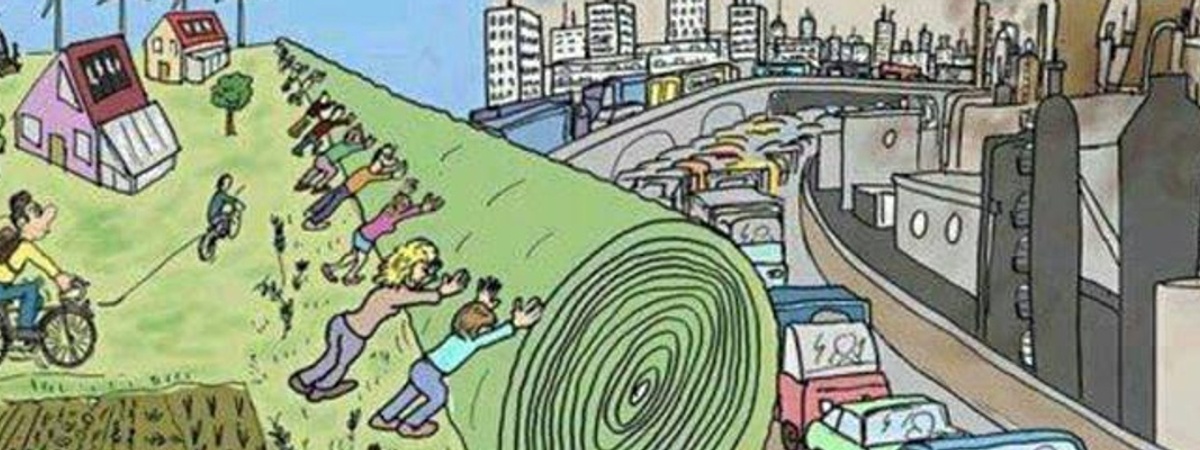

Welcome to Playful Learning Landscapes Action Network on ChangeX! It’s time to reimagine how the ordinary can become extraordinary.
We share space with many wildlife species in cities. They are all connected to us in same way. A large tree can pump around 100 gallons of water a day in the air and this moist is essencial for us to breathe. Grasslands and soil's insects are important to help creating a way for the water drainage through the soil. Trees depends on pollinators to survive, and we too for our food security. Creating awareness about species that coexist with us, and how we impact them everyday, can help us to think of better strategies to coexist.
Can you imagine yourself directly contributing to save a endangered species? For example, transforming your lawn into pollinator garden, and connecting to other gardens can provide vital habitat for the critically endagered Rusty-Patched Bumble Bee. This species' range includes the city of Chicago, and it is about to disapear. If you don't have a lawn, you can help colonize alley spaces with native flowers. Or plant in vases. Or help to keep the leaves, which are very important for reproduction of many insect species. We can also act by protecting our waters and demanding companies to remove roundup and other bad pollutants from their shelves.
Connecting everyday with nature is known to be related to levels of happiness, and very important for menthal health. It is amazing to engage family and neighbours about the species we can observe and help right around us.
Time is short and we must act now to protect wildlife. With this project, we are going to use art and technology to promote urgent awareness about nature conservation and actions to improve coexistence with wildlife in cities.
Welcome to Playful Learning Landscapes Action Network on ChangeX! It’s time to reimagine how the ordinary can become extraordinary.
We share space with many wildlife species in cities. They are all connected to us in same way. A large tree can pump around 100 gallons of water a day in the air and this moist is essencial for us to breathe. Grasslands and soil's insects are important to help creating a way for the water drainage through the soil. Trees depends on pollinators to survive, and we too for our food security. Creating awareness about species that coexist with us, and how we impact them everyday, can help us to think of better strategies to coexist.
Can you imagine yourself directly contributing to save a endangered species? For example, transforming your lawn into pollinator garden, and connecting to other gardens can provide vital habitat for the critically endagered Rusty-Patched Bumble Bee. This species' range includes the city of Chicago, and it is about to disapear. If you don't have a lawn, you can help colonize alley spaces with native flowers. Or plant in vases. Or help to keep the leaves, which are very important for reproduction of many insect species. We can also act by protecting our waters and demanding companies to remove roundup and other bad pollutants from their shelves.
Connecting everyday with nature is known to be related to levels of happiness, and very important for menthal health. It is amazing to engage family and neighbours about the species we can observe and help right around us.
Time is short and we must act now to protect wildlife. With this project, we are going to use art and technology to promote urgent awareness about nature conservation and actions to improve coexistence with wildlife in cities.
There’s a giant dead zone in the Gulf of Mexico — thanks in large part to pollution from Chicago
By TONY BRISCOE
JUN 14, 2019 AT 5:00 AM
https://www.chicagotribune.com/news/breaking/ct-met-dead-zone-gulf-of-mexico-midwest-20190612-story.html
"Polluted Chicago Water Travels Over 1,000 Miles and Wreaks Havoc in the Gulf
An algae bloom in the Gulf of Mexico has resulted in an oxygen-starved area the size of Massachusetts. Part of the problem is sewage runoff flowing south from Chicago"
https://www.planetizen.com/news/2019/06/104921-polluted-chicago-water-travels-over-1000-miles-and-wreaks-havoc-gulf
1) Promote a contest at local schools "the sea starts here" painting on drains, following the United Nations program;
2) Promote the contest "Pollinator gardens";
3) Promote a bioblitz on Urban Threatened Species;
4) Camera trapping wildlife and sharing through inaturalist;
5) Live streaming wildlife feeders;
6) Promote Supermarket and Chain stores engagement by creating pollinator gardens and sharing educational materials;
7) Visual Art displays at iconic places showing importance of nature;
8) Promote a public system of education for the identification for trees and other wildlife
9) Show legislators how private pollinator gardens represent an ecosystem service and advocate payment for ecosystem services for pollinator gardens.

261 Participants
